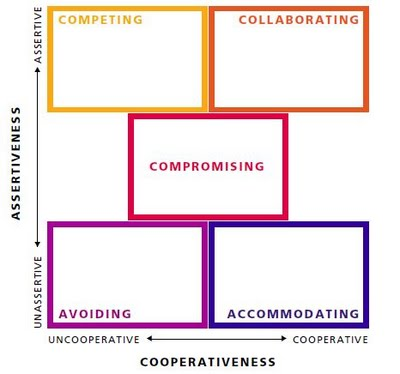
According to Thomas Kilmann, there are five types of conflict styles, all of which we see reflected in characters on the show “The Good Place.” Which style resonates most with how you handle conflict? It’s helpful to learn these conflict styles and recognize not only which one you have, but to also acknowledge the conflict styles of the people in your life. Doing this will help you to better work with them.
Take a look at each character’s conflict style and learn tips for how to best work through conflict with each one.

While we all love the lead character, Eleanor, she is power oriented and always trying to win.
Tip: With a competitor, find a way for them to feel like they are winning. Often with competitive types, you can get what you want just by labeling them as the winner.

The architect of Neighborhood 12358W, Michael continually tries to find a solution and build consensus with those around him.
Tips: Collaborators are great because they want to work with you, so lean into that. Trust that they want what is best for both of you and be willing to problem solve together.

Chidi, the anxiety-ridden moral philosophy professor, is constantly trying to find a solution that works for everyone. However, that usually means no one is completely happy.
Tip: Compromisers want everyone to get something, so try to show them a way that might happen. If you come in with the plan, they will likely go for it if it at all seems reasonable.

At one point or another, we’ve all been Tahani: Choosing to avoid a problem instead of addressing it head-on.
Tip: Find a way to make the situation sound more like an opportunity rather than something scary and explosive. Avoidant types usually fear strong negative emotions, so keep yourself collected and the energy calm.

Sacrificing her own viewpoint for the happiness of others is the dominant quality we see in Janet during times of conflict.
Tip: This may sound like a great person to deal with because you’ll always get your way, but it tends to lead to resentment over time. When working with accommodators, make sure that they also get something so they don't harbor that resentment later.


Comments